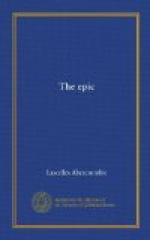FOOTNOTES:
[Footnote 4: From the version of the Marquise de Sainte-Aulaire.]
III.
THE NATURE OF EPIC
Rigid definitions in literature are, however, dangerous. At bottom, it is what we feel, not what we think, that makes us put certain poems together and apart from others; and feelings cannot be defined, but only related. If we define a poem, we say what we think about it; and that may not sufficiently imply the essential thing the poem does for us. Hence the definition is liable either to be too strict, or to admit work which does not properly satisfy the criterion of feeling. It seems probable that, in the last resort, classification in literature rests on that least tangible, least definable matter, style; for style is the sign of the poem’s spirit, and it is the spirit that we feel. If we can get some notion of how those poems, which we call epic, agree with one another in style, it is likely we shall be as close as may be to a definition of epic. I use the word “style,” of course, in its largest sense—manner of conception as well as manner of composition.
An easy way to define epic, though not a very profitable way, would be to say simply, that an epic is a poem which produces feelings similar to those produced by Paradise Lost or the Iliad, Beowulf or the Song of Roland. Indeed, you might include all the epics of Europe in this definition without losing your breath; for the epic poet is the rarest kind of artist. And while it is not a simple matter to say off-hand what it is that is common to all these poems, there seems to be general acknowledgment that they are clearly separable from other kinds of poetry; and this although the word epic has been rather badly abused. For instance, The Faery Queene and La Divina Commedia have been called epic poems; but I do not think that anyone could fail to




